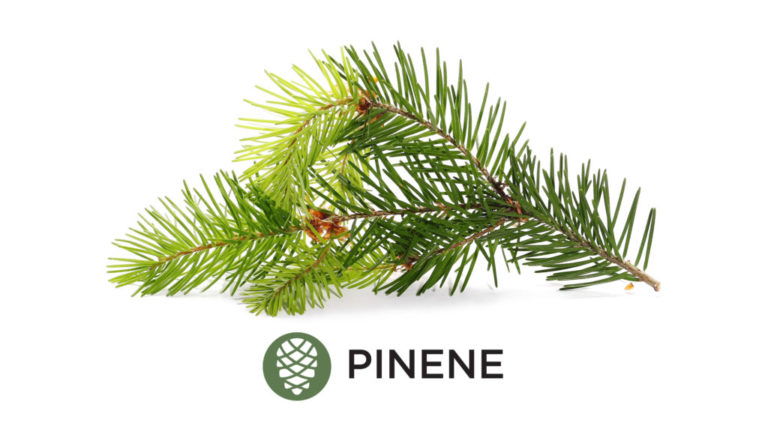 Photo by: Gina Coleman/Weedmaps
Photo by: Gina Coleman/WeedmapsImage lightbox

Pinene is one of the most commonly occurring terpenes in cannabis. It is currently under investigation for its potential to treat numerous conditions including inflammation, cancer, and respiratory conditions.
What is pinene?
As its name would imply, the pinene terpene has the fragrance of a pine tree. It's found in pine trees and other plants, including cannabis. It's commonly used in insecticides and as a flavoring agent. One unusual potential use of pinene is as a biofuel in spark-ignition engines. That's because a pinene dimer (two identical pinene molecules linked together) may have volumetric heating values that rank as high as rocket fuel. Researchers at the Georgia Institute of Technology and the Joint Bio-Energy Institute have produced pinene synthetically through the use of a bacterium, according to a 2014 article published in the journal American Chemical Society.
What is the difference between alpha-pinene and beta-pinene?
There are two forms of pinene: alpha-pinene and beta-pinene. Alpha-pinene is more prevalent in cannabis and the most abundant terpenoid found in nature. Researchers are studying whether alpha-pinene can treat or prevent Alzheimer's disease and other neurological conditions.
What is pinene found in?
The aromatic pine terpene is found in dill, basil, rosemary, parsley, and the essential oils they yield. In addition, coniferous trees, including pine with their fragrant pine needles, are rich in pinene. Besides savoring the refreshing scent of pine trees on a winter day, you may have encountered pinene at your kitchen table. Pine nuts contain pinene oil, as do lime and orange peel. So, if you've had orange peel candy, a salad sprinkled with pine nuts, or a slice of key lime pie, you've tasted this terpene. In contrast, pinene is known to be highly unattractive to insects, so it's an ingredient in many repellents.
Therapeutic properties of pinene
The predominant type in cannabis, alpha-pinene, is also the one that could offer the most therapeutic benefits. Potential alpha-pinene benefits are anti-inflammatory, anti-cancer, and antimicrobial, in addition to respiratory and neuroprotective.
Anti-inflammatory
Many plant essential oils that contain pinene have been shown to reduce inflammation. A 2015 study published in the American Journal of Chinese Medicine found that alpha-pinene exhibits a number of anti-inflammatory properties in animal cells. The authors of the study concluded that the terpene has the potential to treat various inflammatory diseases. Interestingly, it's anti-inflammatory effects could make it an effective additive to sunscreen. It prevents skin damage caused by ultraviolet light according to a 2018 study published in the journal Life Sciences.
Anti-cancer
Many studies in animals and other models have concluded that both alpha- and beta-pinene have significant anti-tumor properties. In fact, when consumed together, both forms of pinene appear to have synergistic effects in reducing tumors, as observed in a 2018 study published in the medical journal Chemotherapy. The study also showed that alpha-pinene could be effective in treating prostate cancer in mice.
Antimicrobial
Alpha-pinene and beta-pinene have also been studied for their antimicrobial effects. One 2012 study published in the Swiss scientific journal Molecules demonstrated that pinene was an especially powerful tool in combating Candida Albicans, a yeast fungus found in the human body that can become harmful if it grows out of control.
Antidepressant
Patients commonly medicate with cannabis to elevate their mood, something that makes sense given the results of a 2012 study published in the Journal of Ethnopharmacology. Beta-pinene, in combination with the terpene linalool, appears to produce effects in mice that are similar to those of antidepressant medications.
Respiratory
A 2011 study published in Molecules tested the ability of alpha- and beta-pinene to fight the infectious bronchitis virus in animal models. The study found that both types of pinene inhibited viral activity in cells, therefore making the terpene a potential aid in resolving bronchitis. The study also established pinene as a possible bronchodilator that could offer relief to those with asthma.
Neuroprotective
In a quest to understand Alzheimer's disease, scientists have investigated alpha-pinene's role in fighting this incurable neurological disorder. Using animal models, scientists concluded that alpha-pinene may be beneficial not only against Alzheimer's disease but also against general dementia, amnesia, cognitive dysfunction, and overall memory loss, according to a 2017 study published in the journal Evidence-based Complementary and Alternative Medicine.
Is pinene good for anxiety?
In Japan, the practice of shinrin-yoku (which translates as “forest bathing” in English) is a living example of plant-based medicine. Japanese physicians and forestry experts believe that walking through a wooded area of pine and other types of trees can have a relaxing effect on the mind and body. Further, in 2017 the International Journal of Environmental Research and Public Health published a comprehensive review of existing research on the practice. The review showed that forest bathing lowered blood pressure and pulse rates and has the potential to lower stress and improve overall health. Thus, pinene, along with many other terpenes found in forests, may have an indirect therapeutic effect on anxiety. More research is needed to understand if pinene may directly affect anxiety.
Role of pinene in cannabis
Pinene is easy to identify in cannabis, more so than many other terpenes, because the pine scent is so strong and distinct. Pinene effects on the cannabis experience will vary depending on the strain, with some infusing energy and others facilitating relaxation.
The numerous cannabis strains abundant in pinene include:
- Jack Herer
- Dutch Treat
- Romulan
- Blue Dream
- Island Sweet Skunk
- Strawberry Cough
- OG Kush
Bottom line
Easily recognizable for its sweet pine aroma, pinene may play a role in fighting inflammation and boosting memory, along with offering an emerging option for the biofuel industry.
Major contributions from Dr. Adie Rae.

